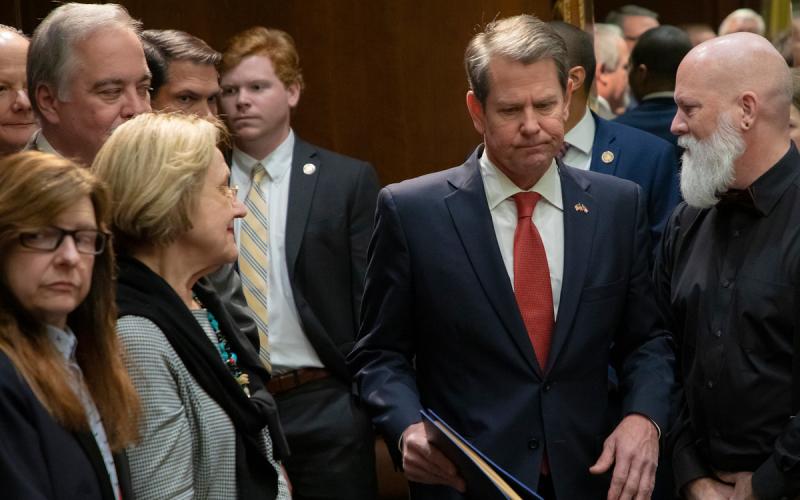By Beau Evans
Staff Writer
Capitol Beat News Service
ATLANTA - Gov. Brian Kemp announced Wednesday he plans to extend Georgia’s shelter-in-place order through the rest of April as coronavirus continues to spread and hit local hospitals hard.
The action will leave social and business restrictions that took effect last Friday in place through April 30. Georgia public schools and colleges remain closed for in-person classes for the rest of the school year.
Inside areas of restaurants, bars and other popular gathering spots are also closed. Grocery stores, pharmacies and restaurants providing delivery and take-out services can still operate. Kemp’s shelter-in-place order also gives businesses leeway to continue minimal operations to stay financially afloat.
Able to issue more extensions, Kemp did not have a hard date Wednesday for when the shelter-in-place order might ultimately end. At a news conference, he said that will depend on how well people keep their distance from each other and practice good sanitary habits.
“There is no playbook for this pandemic that we are facing in our state right now,” Kemp said. “But we will continue to use data, science and the advice of health-care officials to guide our steps toward a safer, healthier and more prosperous future in our state.”
As of noon Wednesday, roughly 9,000 people had tested positive in Georgia for COVID-19, the disease caused by the novel strain of coronavirus that has sparked a global pandemic. The virus had killed 362 Georgians.
Georgia is hustling to pump more supplies and bed space into local hospitals ahead of April 23, when models predict the state’s hospitals will see their highest surge of patients infected with coronavirus.
State officials are still tapping into the national stockpile of masks, gloves and ventilators while also buying shipments from private vendors, said Homer Bryson, director of the Georgia Emergency Management and Homeland Security Agency.
Hospital leaders are combing their properties for unused space to set up more critical-care beds, Kemp said. On Thursday, health officials will start working with the private company Ipsum Diagnostics to boost the speed and number of coronavirus tests at Georgia’s public health labs.
Kemp said Wednesday he is authorizing 1,000 Georgia National Guard members to deploy in Georgia “to assist with the COVID-19 response.”
More than 100 National Guard members have been on duty since last week to boost disease-control measures in elderly care facilities, where the virus has already caused dozens of outbreaks among the state’s most vulnerable population.
Kemp said Wednesday he is also ordering new mandatory rules for elderly care facilities governing visitation, sanitation procedures, health screenings for employees and residents, wearing protective gear and isolating residents with symptoms.
On another topic related to the coronavirus pandemic, Kemp did not say Wednesday whether he would push Secretary of State Brad Raffensperger to delay Georgia’s primary election, currently set for May 19. The governor said that decision is up to Raffensperger.
Raffensperger has said several times the governor must extend the state’s public health emergency before he can act on postponing the primary under state law, though legislative counsel for the General Assembly has disputed that legal interpretation. Kemp announced earlier Wednesday an extension of the emergency status through May 13, more than two weeks after early voting starts in late April.
Raffensperger’s office did not respond to a request for comment Wednesday on whether he is considering delaying the primary.
Meanwhile, new restrictions on church services could be on the way later this week, Kemp hinted. While most congregations have moved services online, Kemp noted local authorities have needed to disperse some church services since the shelter-in-place order took effect last week.
“I hope I don’t have to be in a position where I have to do that,” Kemp said Wednesday, referring to potentially ordering mandatory closures for in-person church services.
The governor is also poised to order a shutdown of vacation and short-term property rentals involving stays of 30 days or less, starting midnight Wednesday and lasting through April 30. The order will not include hotels or camping grounds and exempts short-term rentals that have already been purchased and booked before midday on April 9, Kemp said.
That move came in response to concerns over beaches remaining open under the statewide shelter-in-place order, Kemp acknowledged Wednesday. The governor pledged he would close beaches if attendance grows too high, but he said that has not happened so far.
“We know exactly how many people are on the beaches at all times of the day,” Kemp said.

